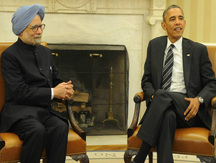 Manmohan and Obama at the White House.
Manmohan and Obama at the White House. WASHINGTON, D.C. - Ignoring India’s concerns, the Obama administration has thrown its full weight behind the comprehensive immigration reform bill passed by the US Senate, arguing that it would benefit immigrants from countries like India and China.
The White House made its position clear on the contentious H-1B provisions of Senate version of the immigration bill in a fact sheet prepared for the Asian American and Pacific Islander Community (AAPI), which includes the Indian-American community.
“The Senate bill would create new visa pathways for immigrant entrepreneurs and investors and make key improvements to the H-1B program,” the White House said in its fact sheet, without taking note of the concerns of India and Indian businesses in this regard. Prime Minister Manmohan Singh had raised the issue when he met President Barack Obama at the White House in September.
The White House made its position clear on the contentious H-1B provisions of Senate version of the immigration bill in a fact sheet prepared for the Asian American and Pacific Islander Community (AAPI), which includes the Indian-American community.
“The Senate bill would create new visa pathways for immigrant entrepreneurs and investors and make key improvements to the H-1B program,” the White House said in its fact sheet, without taking note of the concerns of India and Indian businesses in this regard. Prime Minister Manmohan Singh had raised the issue when he met President Barack Obama at the White House in September.
“The Senate bill would create new visa pathways for immigrant entrepreneurs and investors and make key improvements to the H-1B program,” the White House said.
China, India and South Korea are in the top ten sending countries of immigrant entrepreneurs. The Senate bill would create a new visa program for foreign entrepreneurs to start and grow their businesses in the US, the White House said, listing out the benefits of the bill to the American Association of Physicians of Indian Origin (AAPI) community.
The new INVEST visa (Investing in New Venture, Entrepreneurial Startups and Technologies) would allow entrepreneurs who attract a threshold level of financing from US investors or revenue from US customers to start and grow their businesses, and to remain permanently if their companies grow further and create jobs for American workers, it said.
The Senate bill would also improve the EB-5 Immigrant Investor Program, and increase the number of available green cards for immigrant investors from approximately 10,000 annually to approximately 14,000 annually, it said. Arguing that petitioners from India (64 per cent) and China (7.6 per cent) continue to be the largest users of the H-1B program, the White House said the Senate bill would increase the number of available H-1B visas by raising the baseline cap from 65,000 visas to 115,000 visas per year.
“Improvements to the H-1B program would allow spouses of H-1B visa holders to work in the US and increase worker mobility by establishing a 60-day transition period for H-1B workers to change jobs,” it added. (PTI)
China, India and South Korea are in the top ten sending countries of immigrant entrepreneurs. The Senate bill would create a new visa program for foreign entrepreneurs to start and grow their businesses in the US, the White House said, listing out the benefits of the bill to the American Association of Physicians of Indian Origin (AAPI) community.
The new INVEST visa (Investing in New Venture, Entrepreneurial Startups and Technologies) would allow entrepreneurs who attract a threshold level of financing from US investors or revenue from US customers to start and grow their businesses, and to remain permanently if their companies grow further and create jobs for American workers, it said.
The Senate bill would also improve the EB-5 Immigrant Investor Program, and increase the number of available green cards for immigrant investors from approximately 10,000 annually to approximately 14,000 annually, it said. Arguing that petitioners from India (64 per cent) and China (7.6 per cent) continue to be the largest users of the H-1B program, the White House said the Senate bill would increase the number of available H-1B visas by raising the baseline cap from 65,000 visas to 115,000 visas per year.
“Improvements to the H-1B program would allow spouses of H-1B visa holders to work in the US and increase worker mobility by establishing a 60-day transition period for H-1B workers to change jobs,” it added. (PTI)

 RSS Feed
RSS Feed
